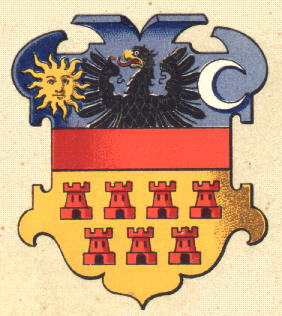Principality of Siebenbürgen: Difference between revisions
Knorrepoes (talk | contribs) m (Text replacement - "|center]] ====Origin/meaning====" to "|center]] ====Official blazon==== ====Origin/meaning====") |
Knorrepoes (talk | contribs) m (Text replacement - ".jpg|center]] ====Official blazon====" to ".jpg|center|Arms of {{PAGENAME}}]] ====Official blazon====") |
||
| Line 7: | Line 7: | ||
'''PRINCIPALITY OF SIEBENBÜRGEN (Transsylvania)''' | '''PRINCIPALITY OF SIEBENBÜRGEN (Transsylvania)''' | ||
[[File:siebenbu.ahe.jpg|center]] | [[File:siebenbu.ahe.jpg|center|Arms of {{PAGENAME}}]] | ||
====Official blazon==== | ====Official blazon==== | ||
Revision as of 10:13, 26 March 2016
| Heraldry of the World Civic heraldry of the Austro-Hungarian Empire |
PRINCIPALITY OF SIEBENBÜRGEN (Transsylvania)
Official blazon
Origin/meaning
The Duchy of Siebenbürgen (English Transsylvania, now in Romania) was conquered in 1688 by Emperor Leopold I and united with Hungary. In 1765 Empress Maria-Theresia made Siebenbürgen a Grand Duchy (previously it was a principality). The Hungarian name was Erdély. The arms show in the upper half an eagle flanked by a sun and a crescent. The eagle is derived from the old arms of the Duke of Siebenbürgen from 1659. The sun and crescent are derived from the arms of the Székelys people. The lower half shows seven castles, a canting element (Siebenbürgen = seven castles in German)
Contact and Support
Partners:
Your logo here ?
Contact us
© since 1995, Heraldry of the World, Ralf Hartemink 
Index of the site
Literature : Ströhl, 1890










